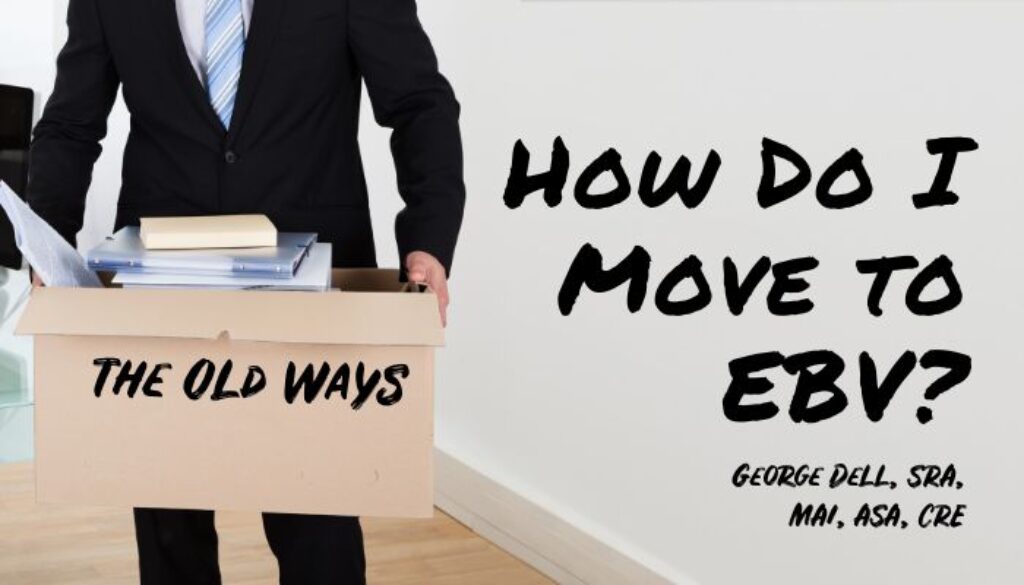Evidence Based Valuation – EBV is the future for valuation professionals. It requires the appraiser’s experience, judgment, and knowledge. It’s not hard, just new.
EBV captures the huge advantages of modern technology: computer power, open-source software, and market visualization.
EBV provides an exciting learning path toward better service, personal satisfaction, and income security.
Most importantly, EBV provides users (lenders, investors, and equity enforcers) reliable results, and badly-needed additional information.
Evidence Based Valuation differs from the legacy “process” in several ways. The most important is that data selection (the evidence) is not based on personal judgment – rather, it is based on systematic measures of similarity, taken from the market data itself. This is the key concept, the foundation of the Data Science Approach to valuation.
The result of this commitment is that appraisal standards become possible to comply with. As per standard 1-4, the analyst is to use all available, relevant data – not just 4 or 5 hand-picked sales.
The benefit of using all information necessary, (and such comparable sales data as are available), is that the analytic result is much more accurate and certain. It also enables other important results, such as:
- a reliability (risk) score;
- fundamental value;
- simple forecasting;
- conditional values;
- real-time updates;
- “fintech” linking.
The profession, any company, or large client (such as GSEs), and the regulatory structure can benefit.
Individuals also have a clear path toward competency. The following are the basic areas of change or addition from traditional, obsolete, appraisal process:
- The emphasis is measuring markets, not comparing comps.
- Computer-generated algorithms build on complete data.
- Visualization (graphs) enable market comprehension.
- Simple number descriptives are all that is needed.
- The fiction of “most probable price” is avoided.
- The factual input enables objective results.
- Audit, not subjective review is possible.
- Reproducibility is fully enabled.
The asset analyst (appraiser) should learn the overall data science process, as applied to valuation. We call this EBV© (Evidence Based Valuation). This process is an interplay of the human expert with the power of computation. The interplay is primarily visual, using graphs, maps, and numerical descriptives.
Data Science relies substantially on open-source software. The CAA (Community of Asset Analysts) does recommend the highly popular ‘R’, with the Posit (Rstudio) user interface. Posit RStudio combines pick-list GUI visual interface, and dynamic ‘smart’ menus, and actual tweakable code, when needed.
The Data Science Approach is the future of valuation, risk analytics, and portfolio management.

May 17, 2023 @ 5:06 am
EBV is not new, any good experienced Appraiser is already applying all the factors noted above. You need that experience along with any automated generated data OR results fail and that has been proven over and over again.
May 17, 2023 @ 7:34 am
How do you get the Data Science Approach into the Appraisal Institute textbooks?
May 17, 2023 @ 8:46 am
The old ways will die hard. We can only focus on providing this more advanced methodology to clients and users who place value on EBV conclusions and often indisputable evidence. Institutions and individuals who continue to dig their heels in resistance to change will come around to the realities of the modern appraisal process or they will become irrelevant. Its a bit like the lighthouse and the battleship, where change is the constant, immovable force. It’s their call to change course or stay on the same path they have for decades.
See also; Decay – decay, decompose, rot, putrefy, spoil mean to undergo destructive dissolution. decay implies a slow change from a state of soundness or perfection. a decaying mansion. decompose stresses a breaking down by chemical change and when applied to organic matter a corruption.
May 25, 2023 @ 9:35 am
It is interesting that appraisers are being accused of being resistant to change yet the powers that be will not let go of requirements of 3 comparable sales and the most probable price